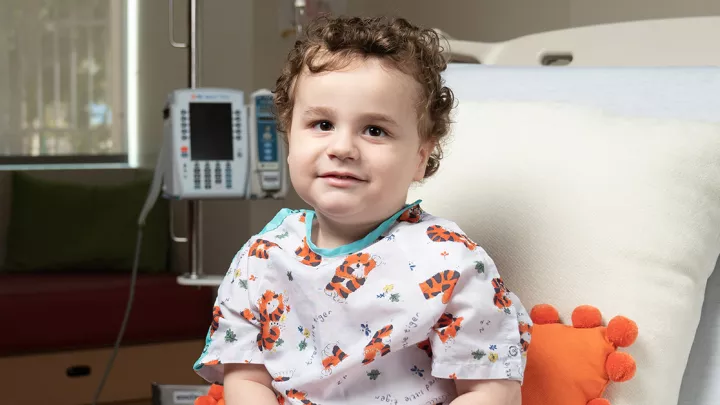
Melinda Chang, MD
As a dual fellowship trained pediatric and neuro-ophthalmologist, Dr. Chang is committed to providing the highest level of specialty care to children with neurologic and neuro-developmental disorders that affect the eyes. She combines medical and surgical expertise with a translational research program focused on improved understanding and treatment of pediatric neuro-ophthalmologic disorders.
Dr. Chang completed a double bachelor’s degree in Neuroscience and Kinesiology, graduating summa cum laude from the University of Southern California. She earned her medical degree at Washington University in St. Louis, then completed ophthalmology residency and pediatric ophthalmology fellowship at the Stein Eye Institute at the University of California, Los Angeles. She concluded her training as the first neuro-ophthalmology fellow at the combined Stein Eye Institute-Doheny Eye Institute at UCLA.
Dr. Chang is a member of the American Academy of Ophthalmology (AAO), American Association of Pediatric Ophthalmology and Strabismus (AAPOS), North American Neuro-Ophthalmology Society (NANOS), and Association for Research in Vision and Ophthalmology (ARVO). She serves as an editor for Cochrane Eyes and Vision, and is a reviewer for numerous journals. She has published in major ophthalmology journals and is the recipient of the prestigious Heed Ophthalmic Fellowship, in addition to institutional and national awards during medical school, residency, and fellowship.
Dr. Chang specializes in the management of neurologic disorders that affect the eyes in children, including optic neuritis, idiopathic intracranial hypertension, myasthenia gravis, cortical visual impairment, metabolic and genetic disorders, and brain and optic nerve tumors. She also has an interest in ophthalmologic problems that occur in children with neuro-developmental disorders, such as autism spectrum disorder (ASD). Additionally, she sees patients with general pediatric ophthalmologic concerns, such as amblyopia and strabismus.
Education
Washington University in St. Louis
Riverside Regional Medical Center
Stein Eye Institute at UCLA
Stein Eye Institute at UCLA (Pediatric Ophthalmology)
Stein Eye Institute-Doheny Eye Institute at UCLA (Neuro-Ophthalmology)
Accomplishments
American Board of Ophthalmology
American Academy of Ophthalmology (AAO)
American Association of Pediatric Ophthalmology and Strabismus (AAPOS)
North American Neuro-Ophthalmology Society (NANOS)
Association for Research in Vision and Ophthalmology (ARVO)
Alpha Omega Alpha Honor Medical Society (2011)
Heed Ophthalmic Fellow (2016)
ARVO National Eye Institute Travel Grant (2016)
Stein Eye Institute Excellence in Research Award (2015 and 2017)
North American Neuro-Ophthalmology Society (NANOS) Best Fellow Abstract Award (2017)
Pediatric Neuro-Ophthalmology
Strabismus
Optic Neuropathy
Eye Tracking Disorders
Autism Spectrum Disorder
Cortical Visual Impairment
Publications
Heidary G, Aakalu VK, Binenbaum G, Chang MY, Morrison DG, VanderVeen DK, Lambert SR, Trivedi RH, Galvin JA, Pineles SL. Adjustable Sutures in the Treatment of Strabismus: A Report by the American Academy of Ophthalmology. Ophthalmology. 2022 Jan;129(1):100-109. PMID: 34446304.
Chang MY, Borchert MS. Etiology and Outcomes of Acquired Pediatric Sixth Nerve Palsies. J Neuroophthalmol. 2022 Mar 1;42(1):e254-e259 PMID: 34417775.
Li J, Nguyen AM, Kolin T, Chang MY, Reid MW, Lee TC, Nallasamy S. Evaluation of Streamed Hardware-to-Software Telemedicine Strabismus Consultations Utilizing Video Glasses. Clin Ophthalmol. 2022 Nov 29;16:3927-3933 . PMID: 36471728.
Morrison DG, Binenbaum G, Chang MY, Heidary G, Trivedi RH, Galvin JA, Pineles SL. Office- or Facility-Based Probing for Congenital Nasolacrimal Duct Obstruction: A Report by the American Academy of Ophthalmology. Ophthalmology. 2021 Jun;128(6):920-927. PMID: 33358412.
Chang MY, Borchert MS. Methods of visual assessment in children with cortical visual impairment. Curr Opin Neurol. 2021 Feb 1;34(1):89-96.PMID: 33230032.
Chang MY, Borchert MS. Validity and reliability of eye tracking for visual acuity assessment in children with cortical visual impairment. J AAPOS. 2021 Dec;25(6):334.e1-334.e5. PMID: 34687876.
Chang MY, Borchert MS. Advances in the evaluation and management of cortical/cerebral visual impairment in children. Surv Ophthalmol. 2020 Nov-Dec;65(6):708-724. PMID: 32199940.
Pineles SL, Chang MY, Velez FG. Compartmental Strabismus. J Binocul Vis Ocul Motil. 2020 Jul-Sep;70 (3):71-78. PMID: 32463321.
Chang MY, Binenbaum G, Heidary G, Morrison DG, Galvin JA, Trivedi RH, Pineles SL. Imaging Methods for Differentiating Pediatric Papilledema from Pseudopapilledema: A Report by the American Academy of Ophthalmology. Ophthalmology. 2020 Oct;127(10):1416-1423. PMID: 32386809. h
Pineles SL, Chang MY, Holmes JM, Kekunnaya R, Özkan SB, Velez FG. Innovative techniques for the treatment of adult strabismus. J AAPOS. 2019 Jun;23(3):132-139. PMID: 31004784.
Research
Dr. Chang’s research is aimed at improving understanding and treatment of neurologic and neuro-developmental disorders that affect the eyes in children. She has a particular interest in studying eye tracking in children with autism spectrum disorder (ASD). Other areas of interest include application of novel ophthalmic imaging techniques to neuro-ophthalmologic disorders and innovations in strabismus surgery. She is an investigator in the multi-center Pediatric Eye Disease Investigator Group (PEDIG).
Research Studies
We are conducting a research study about visual problems in children with Autism Spectrum Disorder (ASD).
